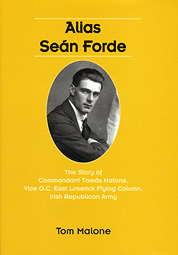
I've been threatening or promising to write this book for over thirty years. I regret now that I didn't do so before my father died, not only because it would have saved me months of research and reading but I would have liked to set the record straight concerning some events as described in the original version of Limericks Fighting Story - something he was urged to do himself by his former comrades and by his own family. For this reason rather than narrate the stories of the Ballylanders and Kilmallock Barrack attacks myself I have allowed credible participants in these actions to tell the stories. In the case of the escape from Mountjoy I had no option other than to plagiarise someone else's story so again I allowed one who took part in the escape to describe it.
Then in Sworn to be Free Piaras Beaslai writing of the escape from Mountjoy neglects to mention Malone though he was one of the "Politicals' chosen by Collins for the escape. Understandably I felt that he had been written out of the story of the time perhaps because of his political stance in the 20s, 30s and later.
I have seen the statements made to the Bureau of Military history by many of the participants in the fight in East Limerick and all bear out my contention that Walter Mitty was alive and well when parts of the original Limericks Fighting Story was written.
Happily a revised version, edited by J. M. McCarthy, Brigade Adjutant, which set the record straight, was published later. I only became aware of this when doing research into my father's career and this helped to defuse the frustration and anger I felt whenever I read the original.
Tom Malone, Luimneach, Lughnasa 2000